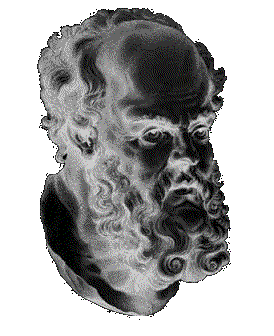
-- "The shortest and surest way to live with honor in the world, is to be in reality what we would appear to be; and if we observe, we shall find, that all human virtues increase and strengthen themselves by the practice of them"
Despite his prominent role in contributing to the history and evolution of ideas, morals, and philosophy, Socrates left nothing in print. The majority of our knowledge of the man comes directly from his pupil, Plato (c. 427-347), who may have been more keen on addressing the societal issues of the day than presenting the actual facts-- which makes it difficult for modern critics to determine the true Socratic thought process.
Perhaps the most reliable of Plato's writings on Socrates is The Apology. It is essentially Plato's written transcript of the dialogue involving Socrates's defense in his trial against the corruption of youth (Note: the word "apology" in this sense means "defense-speech"). However, it is quite blatant that Plato created the transcript in attempt to justify the meaning of Socrates' life and idealize his resolution for death. Yet, aside from the discrepancies of fact, Plato does indeed offer excellent account of Socrates' ideas including: the necessity for one to act upon his own moral code and the importance of seeking knowledge.
This website will attempt to offer a definitive look on Socrates' life, moral conduct, and his contribution to the modern way of thinking...